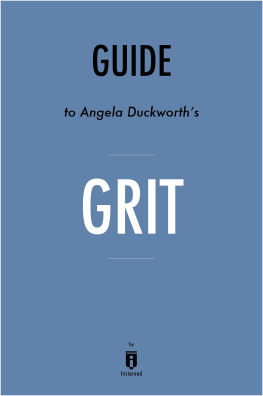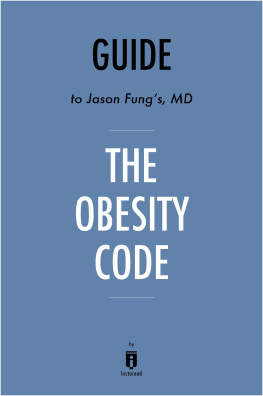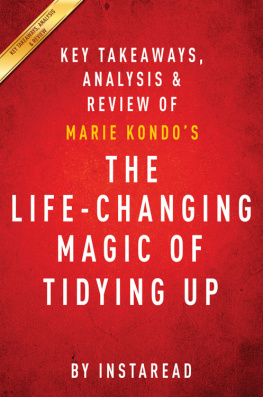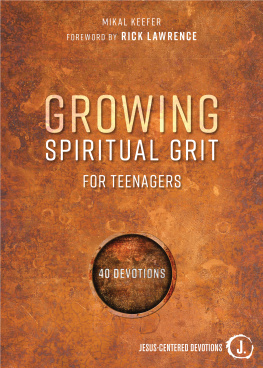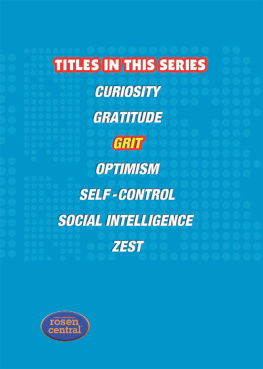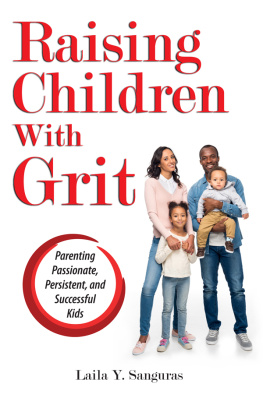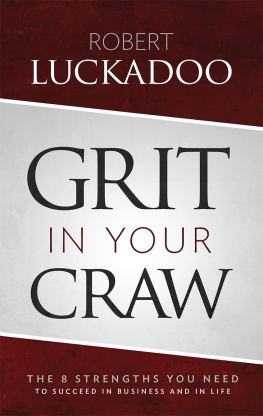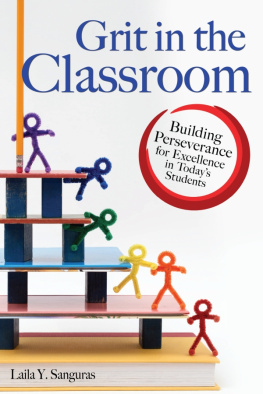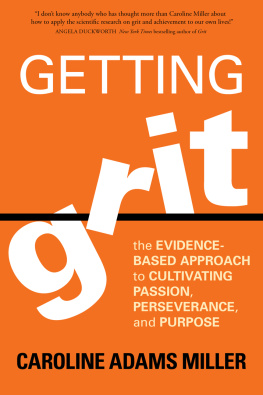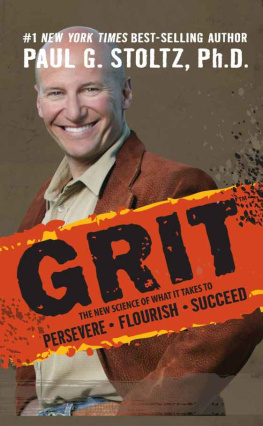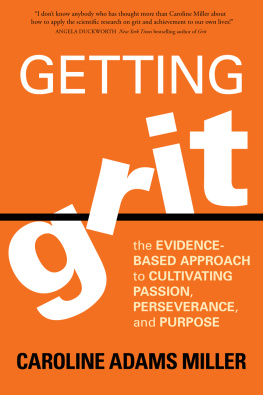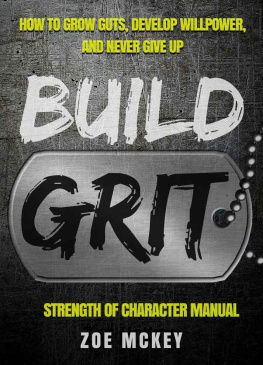Guide to
Angela Duckworths
Grit
The Power of Passion and Perseverance
by
Instaread
Please Note
This is a companion to the original book.
Copyright 2016 by Instaread. All rights reserved worldwide. No part of this publication may be reproduced or transmitted in any form without the prior written consent of the publisher.
Limit of Liability/Disclaimer of Warranty: The publisher and author make no representations or warranties with respect to the accuracy or completeness of these contents and disclaim all warranties such as warranties of fitness for a particular purpose. The author or publisher is not liable for any damages whatsoever. The fact that an individual or organization is referred to in this document as a citation or source of information does not imply that the author or publisher endorses the information that the individual or organization provided. This concise companion is unofficial and is not authorized, approved, licensed, or endorsed by the original books author or publisher.
Table of Contents
Overview
In Grit: The Power of Passion and Perseverance, Angela Duckworth discusses her research into the characteristics of successful people. She argues that innate talent is less important to success than the willingness to persevere despite difficulty and initial failure.
People tend to believe that innate ability is the most important determinant of success and achievement. However, IQ tests and other measures of supposedly natural talent are poor predictors of performance. On the other hand, questionnaires designed to measure perseverance and determination correlate these qualities with success. Hard workers with determination can succeed even in fields like math, which students usually regard as dominated by people with talent or genius.
Grit itself is not a fixed characteristic. Rather, it is a trait that can be learned and cultivated. Individuals can build grit by focusing on their own passions and by cutting out activities or goals that distract from more central endeavors. Grit can also be built through positive reinforcement. People who are taught that hard work can lead to success are more likely to put in hard work and to be successful.
Parents and teachers can also encourage grit. Extracurricular activities, which help children to focus on their passions and to achieve concrete goals, can help build perseverance. Cultures or communities that focus on hard work and positive achievement, like some sports teams, can also enhance the grit of team members and participants.
Grit is not just about success; it is also about fulfillment. Hard work in pursuit of passion is exciting and satisfying. Determined people not only succeed, but attain personal satisfaction even when they experience setbacks or failure. The study of grit is therefore vital to individual happiness as well as individual achievement.
Important People
Angela Duckworth is a professor of psychology at the University of Pennsylvania. Her research focuses on the roots of success and character. Grit is her first book.
Amanda and Lucy Duckworth are Angela Duckworths daughters.
Pete Carroll is the head coach of the Seattle Seahawks.
Dan Chambliss is a sociology professor at Hamilton College. He is known for his study of excellence in competitive swimming.
Kerry Close was the winner of the 2006 Scripps National Spelling Bee.
Mihaly Csikszentmihalyi is a Hungarian psychologist known for his study of flow, or effortless concentration.
Robert Eisenberger is a psychology professor at the University of Houston who researches motivation and effort.
Anders Ericsson is a Swedish psychologist known for his study of expertise. His research inspired Malcolm Gladwells 10,000 hour rule: the theory that expertise requires 10,000 hours of practice. He is the author of the 2016 book Peak: Secrets from the New Science of Expertise.
Steve Maier is a professor of neuroscience at the University of Boulder. He researches how helplessness affects the brain.
Marty Seligman is a psychologist and author known for the theory of learned helplessness. Seligman was Duckworths graduate advisor.
Key Insights
- Talent is less important than grit for achieving success.
- The grit scale can quantify grit. It can be used to predict success.
- To cultivate grit, it is important to identify ones passions.
- High achievers improve their skills through difficult, deliberate practice.
- Gritty people feel they have control over their fate and that hard work can change outcomes.
- In their parenting, adults should provide love, support, and examples of passion and determination.
- Childrens extracurricular activities encourage the development of grit.
- Gritty cultures or communities can create gritty individuals.
Analysis
Key Insight 1
Talent is less important than grit for achieving success.
Analysis
Officials at West Point have long tried to determine why some students make it through the Beast, a difficult seven-week summer training gauntlet, while others drop out. Cadets with high SAT scores or high grades were no more likely to survive the Beast than those with lower scores. This suggested that talent was not the issue. On the other hand, measures of grit, or perseverance, successfully predicted that cadets would finish the Beast, just as they have proven more broadly to be good predictors of high school graduation. People with grit are more likely to succeed at whatever task they set themselves whether they use their determination to achieve good or evil. Talent, on the other hand, seems to have little correlation with overcoming obstacles.
The relative unimportance of talent is illustrated by the limited success of child prodigies. Some children who exhibit remarkable talent early, such as Mozart, do end up having great careers. But most child prodigies do not go on to adult triumph. In fact, in a 2010 study of 210 child prodigies, researcher Joan Freeman found that only six went on to sweeping adult achievement. [1]
Prodigies often have trouble retaining their focus into adulthood in part because easy early success is poor preparation for overcoming later adversity. After receiving accolades when they are young, prodigies may not be prepared for difficult competition as their peers start to catch up. Prodigies may also become discouraged when they realize how many hours of work they need to put in to continue to receive the same level of recognition that they had when they were young. Finally, prodigies may simply burn out. A piano prodigy may discover as she grows older that shes no longer interested in the piano and wants to pursue other interests. Great early skill does not predict grit, and so does not necessarily predict long-term success. [2]
Key Insight 2
The grit scale can quantify grit. It can be used to predict success.
Analysis
The grit scale, developed by Angela Duckworth, is a psychological test designed to measure perseverance and grit. Individuals are given statements such as Setbacks dont discourage me. I dont give up easily and I am a hard worker. They are then asked to rate on a five-point scale the degree to which these statements fit or describe them.
The test gives each individual a grit score on a 1 to 5 scale, with 5 being the most gritty. A grit score of 3.8 is about average; a grit score of 4.9 puts an individual in the 99th percentile of American adults. Grit scores can change over time. They have been shown to be predictive of success in various fields.
Duckworth began developing the grit scale in 2004. Since then, it has been used by numerous researchers and schools to try to quantify and understand achievement and success. For instance, in 2014, Gabriel Slack, a PhD student at Prairie View A&M University, used the grit scale to measure the perseverance of African American males in remedial programs at historically black colleges and universities in order to try to improve the success rates of these students through counseling and other interventions. [3] The grit scale has also been used to examine the mental well being of surgical residents. Researchers discovered that residents who scored lower on the grit scale were more likely to have later psychological problems. Such residents, the researchers concluded, could benefit from early counseling. [4]
Next page
